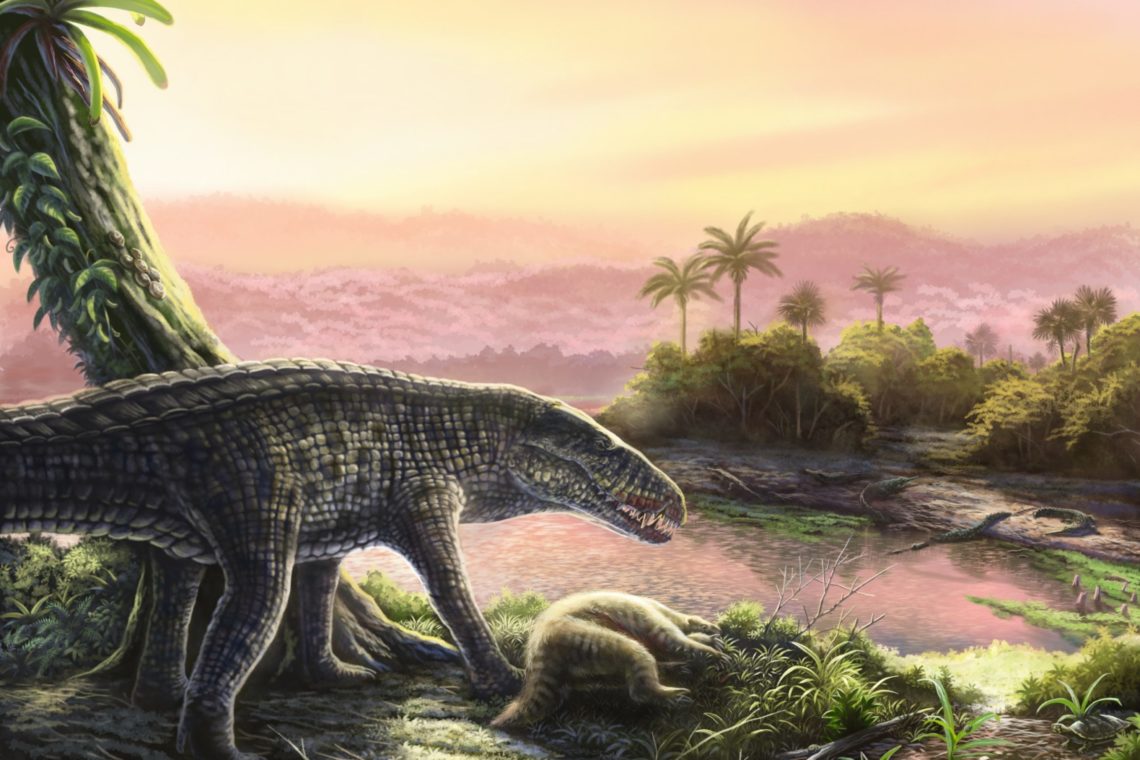Mysterious fossil teeth found in the Caribbean belong to a family of extinct, land-dwelling reptiles that look like what you might get if you crossed a crocodile with a greyhound dog.
This is the conclusion of a team of paleontologists led from the University of Florida, who have revealed that the region provided a refuge for “sebecids” for at least five million years after the creatures went extinct everywhere else.
Sebecids—some species of which reached 20 feet in length and had bony plates of armor embedded in their skin—dominated the landscapes of South America after the mass extinction that killed the dinosaurs 66 million years ago.
It had been thought that they all died out around 11 million years ago, until the new confirmation of sebecid fossils in the Caribbean.
“That emotion of finding the fossil and realizing what it is—that’s indescribable,” said paper author and University of Florida paleontologist Lazaro Viñola Lopez in a statement.
The revelation was some time coming, building on a series of fossil discoveries across the islands of the Caribbean—starting with the unearthing of two 18 million-year-old teeth in Cuba some three decades ago.
Both teeth had a tapered shape and small serrations for tearing into meat, suggesting that it belonged to a large, land-based predator at the top of the food chain.
This presented something of a mystery, however, as paleontologists didn’t think that any creature like that ever lived in the Caribbean.
The enigma was compounded after a third tooth, this one 29 million years old, was found in Puerto Rico. Put together, the fossils were suggestive, but far from enough to identify the particular animal from which they had come.
Things changed when a fourth tooth was unearthed in the Dominican Republic in early 2023 accompanied by two vertebrae, dating back to around six million years. These vertebrae have enabled the researchers to confirm the identity of the species the teeth belonged to.
According to the team, sebecids—who used their long, agile limbs to sprint after prey and tore through flesh with deadly teeth—would have had a great deal of trouble trying to swim across from South America to what is today the Dominican Republic.
Instead, the discovery may support the hypothesis that a pathway of temporary land bridges once weaved its way from the mainland to the Caribbean islands.
As for why sebecid remains were never found in the region before, the researchers explained that most Caribbean fossils are found in caves and blue holes, which—while excellent for accumulating and preserving fossils—tend to only contain relatively young specimens.
“You wouldn’t have been able to predict this looking at the modern ecosystem,” said paper author and vertebrate paleontologist Jonathan Bloch of the Florida Museum of Natural History in a statement.
He concluded: “The presence of a large predator is really different than what we imagined before—and it’s exciting to think about what might be discovered next in the Caribbean fossil record as we explore back further in time.”
Do you have a tip on a science story that Newsweek should be covering? Do you have a question about paleontology? Let us know via [email protected].
Reference
Viñola López, L. W., Velez-Juarbe, J., Münch, P., Almonte Milan, J. N., Antoine, P.-O., Marivaux, L., Jimenez-Vasquez, O., & Bloch, J. (2025). A South American sebecid from the Miocene of Hispaniola documents the presence of apex predators in early West Indies ecosystems. Proceedings of the Royal Society B: Biological Sciences, 292. https://doi.org/10.1098/rspb.2024.2891
The post Crocodile-Like Top Predator’s Fossils Discovered in Caribbean: ‘Indescribable’ appeared first on Newsweek.




